Hong Kong: East Asian Research Students Conference at Chinese University of Hong Kong (CUHK)
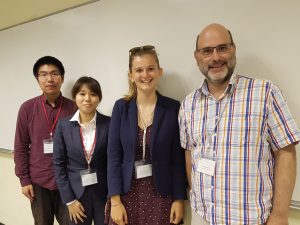 Day 1 – The first day at CUHK was based around small group workshops to discuss our research and presented it to others interested in the field – Anna attended this workshop as her research fell within the western music theory and analysis category. I found it useful to show how my research relates to other fields and also how this traditional discipline of music theory relates to the developments of the web. The day finished with a keynote presentation by Alexander Rehding from Harvard, whose recent work with Harvard’s Sound Lab explores the interaction of music theory, culture and technology.
Day 1 – The first day at CUHK was based around small group workshops to discuss our research and presented it to others interested in the field – Anna attended this workshop as her research fell within the western music theory and analysis category. I found it useful to show how my research relates to other fields and also how this traditional discipline of music theory relates to the developments of the web. The day finished with a keynote presentation by Alexander Rehding from Harvard, whose recent work with Harvard’s Sound Lab explores the interaction of music theory, culture and technology.
Day 2 – Day two was busy; here each student involved gave a lightening presentation on their research, the conference aspect of the work. This gave a chance to present the work in a professional environment, and gain feedback and questions.
Taiwan
In Taiwan we were lucky enough to be invited to two research institutions, National Chiao Tung University in Hsinchu and Academia Sinica in Taipei. Here, we looked around their research facilities and engaged in discussions about AI, Web Science and our own PhD research.
National Chiao Tung University
Day 1 – Our time at National Chiao Tung University began at their Hakka Studies College. The campus itself was very interesting, built to reflect and strengthen the multi-ethnic Hakka culture in the area. Not only dedicated to Hakka cultural studies, the college is also a centre for science, technology and society. As part of our tour around the campus, we visited the VR Studio and trialled the latest virtual reality game based on Hakka culture, which had been created by the students. Some of us were much better than others…. We then visited the communication and cognition laboratory and were shown current research by Masters’ 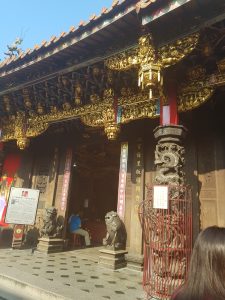 students. We experimented with their eye tracking and emotion tracking technology and discussed the vast possibilities and applications of what they have been studying (including how they are using this work to track how people view websites for advertising). To end our tour, we looked around their state-of-the-art television studio, where students had the opportunity to create and apply virtual environments to recordings. All of this was helped by the use of a ten million dollar camera! At lunch we were taken to have the famous beef noodle soup (the national dish!).
students. We experimented with their eye tracking and emotion tracking technology and discussed the vast possibilities and applications of what they have been studying (including how they are using this work to track how people view websites for advertising). To end our tour, we looked around their state-of-the-art television studio, where students had the opportunity to create and apply virtual environments to recordings. All of this was helped by the use of a ten million dollar camera! At lunch we were taken to have the famous beef noodle soup (the national dish!).
Most of the afternoon was spent in a meeting with researchers from Computer Science who were currently using AI for drone technology. They each presented their research which included: the use of drones for face recognition, speed monitoring and flying in formation. Being from Web Science, we not only asked about the AI technology involved but also the societal implications of their research, including the ethical considerations. It was clear that they had not really engaged in these kind of thought processes before but they were more than willing to engage in a lively discussion.
To end our first day, two students kindly took us on a tour of parts of Hsinchu, where we sampled the very popular bubble tea, visited a temple and trialled some of the local sweet treats. We also attended a concert in the evening put on by the Masters performance students for their end-of-year exam. The performances were all of a very high standard, offering a very varied and interesting repertoire.
Day 2 – As we are currently both based in Music, the second day started with a tour of National Chiao Tung’s music department, which had only recently been built. The department was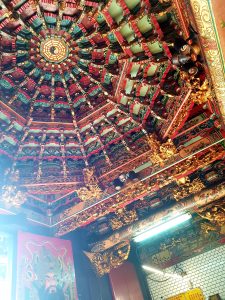 solely for Masters’ students in performance and musicology. The practice rooms in particular were very state-of-the-art. We briefly discussed our research with the academics in music, who were interested in our interdisciplinary nature, before being involved in a meeting with the President of the University. Here, alongside President Chang, academics from music and computer science engaged in discussion about the Web Science Institute at Southampton, the research we do and potential future collaborations. President Chang was impressed with the Institute’s aim and seemed keen on future collaborations for both students and our research, including a scheme they have for students to do some time of their PhD in Taiwan.
solely for Masters’ students in performance and musicology. The practice rooms in particular were very state-of-the-art. We briefly discussed our research with the academics in music, who were interested in our interdisciplinary nature, before being involved in a meeting with the President of the University. Here, alongside President Chang, academics from music and computer science engaged in discussion about the Web Science Institute at Southampton, the research we do and potential future collaborations. President Chang was impressed with the Institute’s aim and seemed keen on future collaborations for both students and our research, including a scheme they have for students to do some time of their PhD in Taiwan.
In the afternoon, we took part in a colloquium with students from National Chiao Tung University. Dr Tom Irvine first provided a brief presentation about Web Science at Southampton, with us on hand to help answer any questions. Then, in turn, we presented our own research and answered questions from the audience. Three computer science students from Chiao Tung presented their research, much of which was based in AI. Of particular interest to our own work, one presentation discussed the use of social media data mining to improve online recommendations, including those given by music-based platforms.
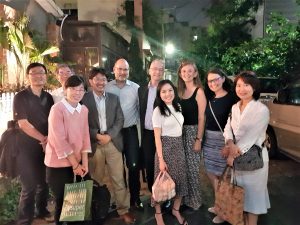 Our final night in Hsinchu was spent at a local restaurant with academics from music and computer science. We got to try lots of new food, including a delicacy known as a ‘century egg’. The meal also gave us an opportunity to reflect on our time at the university and the potential for future collaborations.
Our final night in Hsinchu was spent at a local restaurant with academics from music and computer science. We got to try lots of new food, including a delicacy known as a ‘century egg’. The meal also gave us an opportunity to reflect on our time at the university and the potential for future collaborations.
Academia Sinica: The 5th Taiwanese Music and Audio Computing Workshop
Day 1 – We experienced the high-speed rail network, traveling from Hsinchu to Taipei. In Taipei, we visited Academia Sinica and their Music and Audio Computing Lab. The lab is dedicated to developing multimedia systems, using, for instance, deep learning for music information retrieval. The lab is conducting research very relevant to our own, which Anna had heard about at ISMIR 2017, so we were excited to take part and present in their ‘5th Taiwanese Music and Audio Computing Workshop’.
The first session was dedicated to presentations from academics, with Dr Tom Irvine providing an overview of Web Science and it’s iPhD. Questions addressed the content of taught modules and the types of students who apply, which we helped to answer. Following this, Yi-Hsuan Yang, from Academia Sinica, presented some of his current research. He gave live examples of a machine DJ that could recognise the BPM of tracks and successfully mix them together as well as a way to extract instruments from a piece of pop music and play different layers of the music. Ching-hua Chuan, from the University of Miami whom is using 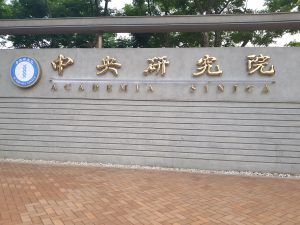 deep learning for modelling polyphonic music. As someone working with score-based music theory in the Music Information Retrieval community, this project was of high interest to Anna, and she has made an invaluable contact, whom she has kept in contact with since the workshop. Finally, Satoru Fukayama, a visiting composer from Japan, presented possible ways for automated music generation to aid in the act of composing. This caused us to question the role of the human composer in machine-generated contexts.
deep learning for modelling polyphonic music. As someone working with score-based music theory in the Music Information Retrieval community, this project was of high interest to Anna, and she has made an invaluable contact, whom she has kept in contact with since the workshop. Finally, Satoru Fukayama, a visiting composer from Japan, presented possible ways for automated music generation to aid in the act of composing. This caused us to question the role of the human composer in machine-generated contexts.
The afternoon was dedicated to student presentations, in which we took part. These presentations included the use of multi-track sequential generative adversarial networks for music generation and canonical time warping. Our own presentations were received well. The audience were highly impressed by Anna’s use of score-based methods for music recommendation, something which the Music and Audio Computing Lab themselves have not researched. Clarissa’s presentation, although more sociological in nature, also prompted some interesting questions from the audience, particularly about the role of the user in recommendations – again highlighting the fact that often these aspects of research, the highly interdisciplinary aspect, is often overlooked.
By Clarissa Brough and Anna Kent-Muller
